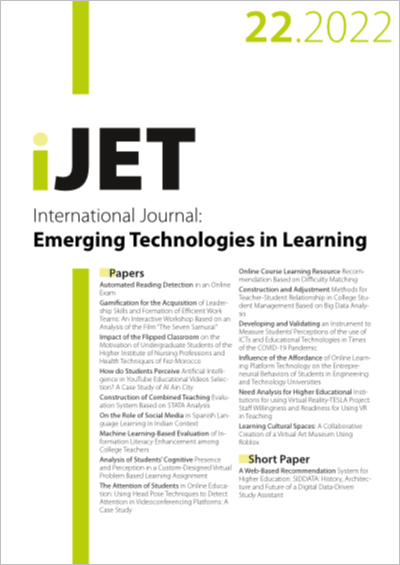Gamification for the Acquisition of Leadership Skills and Formation of Efficient Work Teams: An Interactive Workshop Based on an Analysis of the Film “The Seven Samurai”
DOI:
https://doi.org/10.3991/ijet.v17i22.32351Keywords:
Leadership, Work teams, gamification, cinema, emergent pedagogies, virtual toolAbstract
In this work, we present a teaching experience based on emerging pedagogies and gamification to improve leadership skills and achieve efficient teamwork in scientific-technical areas of Engineering Projects. We designed the contents of a workshop and a virtual tool to create emotional contexts that improved the acquisition of soft skills. The combination of multi-sensory pedagogical strategies and hybrid inductive-deductive methodologies based on tests and team games, inspired by the story line of the classic film "The Seven Samurai" (Kurosawa, 1954), allowed us both to carry out, over a period of two academic years, an “on-the-ground” workshop-game, and a virtual tool to interact in the workshop, while under the COVID-19 restrictions. Despite the different formats and gamification elements used over the two academic years, the metrics for evaluating the efficiency of acquiring these soft skills produced very positive results and, on the whole, did not show significant differences. The cinematographic language and empathy with the story and the characters led the students to identify with and internalize the elements of efficient teamwork and leadership. Movies can provide simple but effective narrative lines on which to build games. Here, we present the contents and details of both workshops as a transferable experience, as well as making the open virtual tool available for the educative community.
Downloads
Published
How to Cite
Issue
Section
License
Copyright (c) 2022 Encarnación V. Taguas, Elvira Fernández-Ahumada, Natalia Borrego-López, Leovigilda Ortiz-Medina, María Benlloch-González, Pedro Sánchez-Zamora, Rosa M. Gallardo, Pablo Lara-Vélez, Jose E. Guerrero-Ginel

This work is licensed under a Creative Commons Attribution 4.0 International License.


